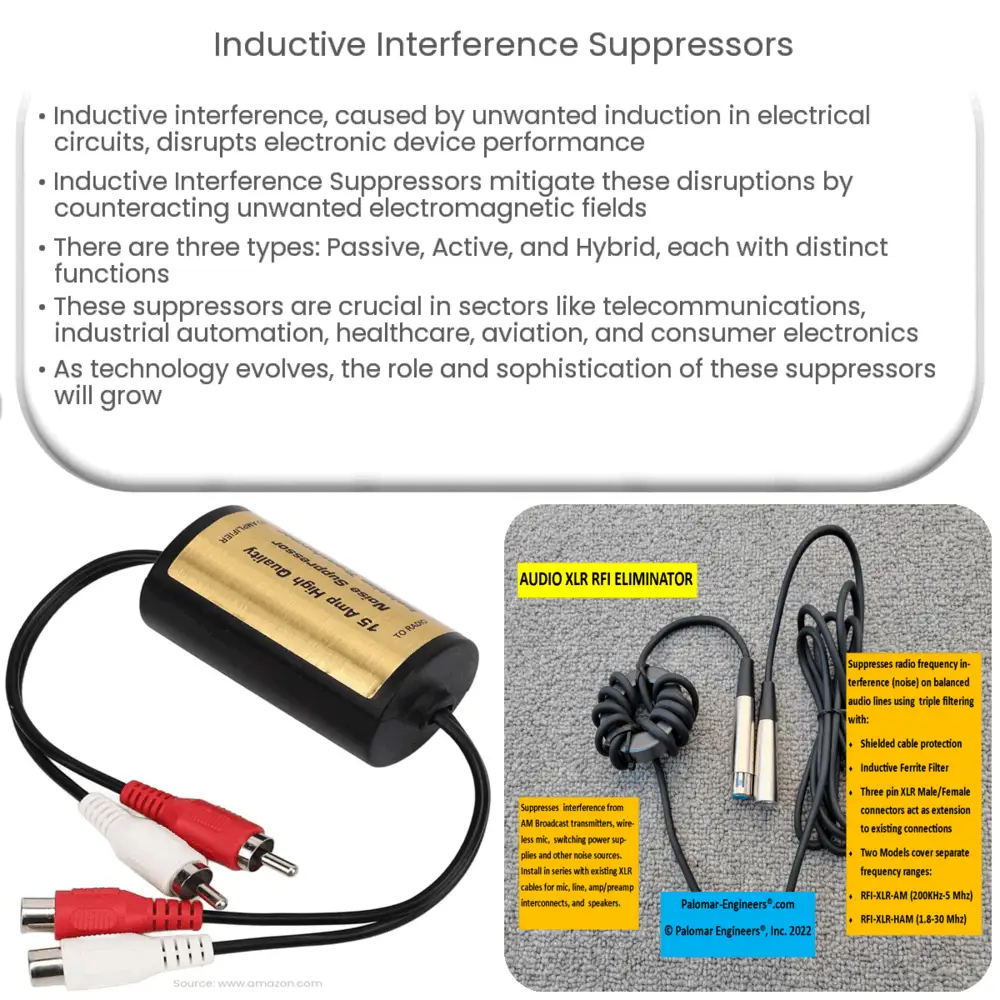Explore the role, types, applications, and future of Inductive Interference Suppressors in our tech-driven world.

Understanding Inductive Interference Suppressors
Inductive interference is a major concern in the world of electronics. This phenomenon can cause significant disruption in the performance of electrical and electronic devices, leading to inefficiencies and even potential device failures. This is where Inductive Interference Suppressors come into the picture.
What is Inductive Interference?
Before delving into the core topic, it’s vital to understand what inductive interference is. Essentially, inductive interference is the unwanted induction of one electrical circuit by another, often due to proximity or design flaws. This causes unexpected electrical ‘noise’ which can interfere with the proper functioning of devices. The problem can range from minor disturbances in audio equipment to severe issues such as a malfunction in critical control systems.
Role of Inductive Interference Suppressors
Inductive Interference Suppressors act as the solution to the aforementioned problem. Their primary role is to minimize or eliminate the disruptive effects of inductive interference on electronic and electrical systems. They function by mitigating the unwanted electromagnetic fields, effectively suppressing the potential interferences.
Working Principle
The working principle of inductive interference suppressors primarily revolves around the properties of electromagnetism. These suppressors utilize components like inductors, capacitors, and resistors, arranged in certain configurations to counteract the effects of unwanted electromagnetic induction.
Types of Inductive Interference Suppressors
- Passive Suppressors: These are the simplest form of suppressors, typically involving just a few components. They primarily use inductors and capacitors to suppress interference.
- Active Suppressors: Active suppressors are more complex and utilize integrated circuits alongside passive components. They provide better control and higher interference suppression capabilities.
- Hybrid Suppressors: A hybrid suppressor is a combination of passive and active suppressors. They offer the best of both worlds – simplicity of design and high efficiency.
Given the potential disruptions that inductive interference can cause in our increasingly interconnected electronic world, the importance of inductive interference suppressors cannot be overstated. They are essential for ensuring optimal performance of our electronic and electrical systems.
Application of Inductive Interference Suppressors
Inductive interference suppressors find application in various industries and environments, owing to the universal need to prevent interference in electronic devices.
- Telecommunication: In telecommunications, these suppressors play a pivotal role in ensuring clear and noise-free communication over various channels.
- Industrial Automation: In factories and manufacturing plants, the suppressors are crucial in preventing errors in control systems due to inductive interference.
- Healthcare: Medical devices, particularly those used in diagnostics and monitoring, need to function with high precision. Interference suppressors are critical in ensuring these devices provide accurate readings.
- Aviation: The aviation sector requires accurate communication and navigation systems. Suppression of inductive interference is essential for maintaining safety and efficiency in this industry.
- Consumer Electronics: From smartphones to home appliances, almost all electronic devices use some form of interference suppression to function smoothly.
The Future of Inductive Interference Suppressors
The future of inductive interference suppressors looks promising, as the demand for more efficient, compact, and smarter devices continues to rise. Advances in technology will likely lead to the development of more sophisticated interference suppression techniques, potentially involving AI and machine learning to anticipate and mitigate inductive interference proactively.
Conclusion
In conclusion, inductive interference suppressors play a fundamental role in the smooth operation of electronic and electrical systems. With the rapid growth and evolution of technology, these devices have become more crucial than ever. From telecommunications to healthcare and consumer electronics, the applications of these suppressors are vast and integral to our daily lives. As the electronic world continues to expand, so will the importance and sophistication of inductive interference suppressors. They are not just the solution to a technical problem but a key enabler in our increasingly interconnected world.


